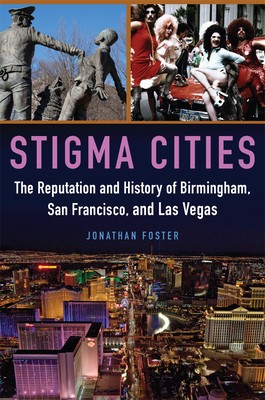
- We will send in 10–14 business days.
- Author: Jonathan Foster
- Publisher: University of Oklahoma Press
- ISBN-10: 0806160713
- ISBN-13: 9780806160719
- Format: 15.2 x 22.9 x 2.1 cm, hardcover
- Language: English
- SAVE -10% with code: EXTRA
Reviews
Description
Growing up in Birmingham, Alabama, a city that he loved, Jonathan Foster was forced to come to grips with its reputation for racial violence. In so doing, he began to question how other cities dealt with similar kinds of stigmas that resulted from behavior and events that fell outside accepted norms. He wanted to know how such stigmas changed over time and how they affected a city's reputation and residents. Those questions led to this examination of the role of stigma and history in three very different cities: Birmingham, San Francisco, and Las Vegas.
In the era of civil rights, Birmingham became known as "Bombingham," a place of constant reactionary and racist violence. Las Vegas emerged as the nation's most recognizable Sin City, and San Francisco's tolerance of homosexuality made it the perceived capital of Gay America. Stigma Cites shows how cultural and political trends influenced perceptions of disrepute in these cities, and how, in turn, their status as sites of vice and violence influenced development decisions, from Birmingham's efforts to shed its reputation as racist, to San Francisco's transformation of its stigma into a point of pride, to Las Vegas's use of gambling to promote tourism and economic growth.
The first work to investigate the important effects of stigmatized identities on urban places, Foster's innovative study suggests that reputation, no less than physical and economic forces, explains how cities develop and why. An absorbing work of history and urban sociology, the book illuminates the significance of ideas in shaping metropolitan history.
EXTRA 10 % discount with code: EXTRA
The promotion ends in 18d.03:36:15
The discount code is valid when purchasing from 10 €. Discounts do not stack.
- Author: Jonathan Foster
- Publisher: University of Oklahoma Press
- ISBN-10: 0806160713
- ISBN-13: 9780806160719
- Format: 15.2 x 22.9 x 2.1 cm, hardcover
- Language: English English
Growing up in Birmingham, Alabama, a city that he loved, Jonathan Foster was forced to come to grips with its reputation for racial violence. In so doing, he began to question how other cities dealt with similar kinds of stigmas that resulted from behavior and events that fell outside accepted norms. He wanted to know how such stigmas changed over time and how they affected a city's reputation and residents. Those questions led to this examination of the role of stigma and history in three very different cities: Birmingham, San Francisco, and Las Vegas.
In the era of civil rights, Birmingham became known as "Bombingham," a place of constant reactionary and racist violence. Las Vegas emerged as the nation's most recognizable Sin City, and San Francisco's tolerance of homosexuality made it the perceived capital of Gay America. Stigma Cites shows how cultural and political trends influenced perceptions of disrepute in these cities, and how, in turn, their status as sites of vice and violence influenced development decisions, from Birmingham's efforts to shed its reputation as racist, to San Francisco's transformation of its stigma into a point of pride, to Las Vegas's use of gambling to promote tourism and economic growth.
The first work to investigate the important effects of stigmatized identities on urban places, Foster's innovative study suggests that reputation, no less than physical and economic forces, explains how cities develop and why. An absorbing work of history and urban sociology, the book illuminates the significance of ideas in shaping metropolitan history.


Reviews